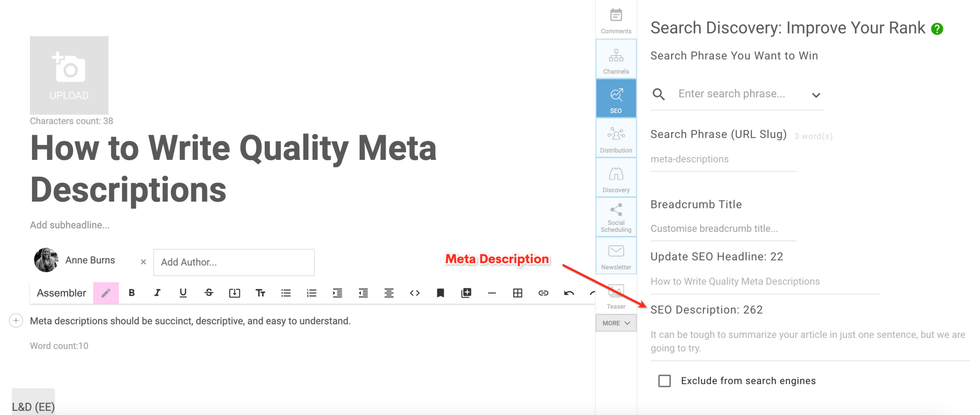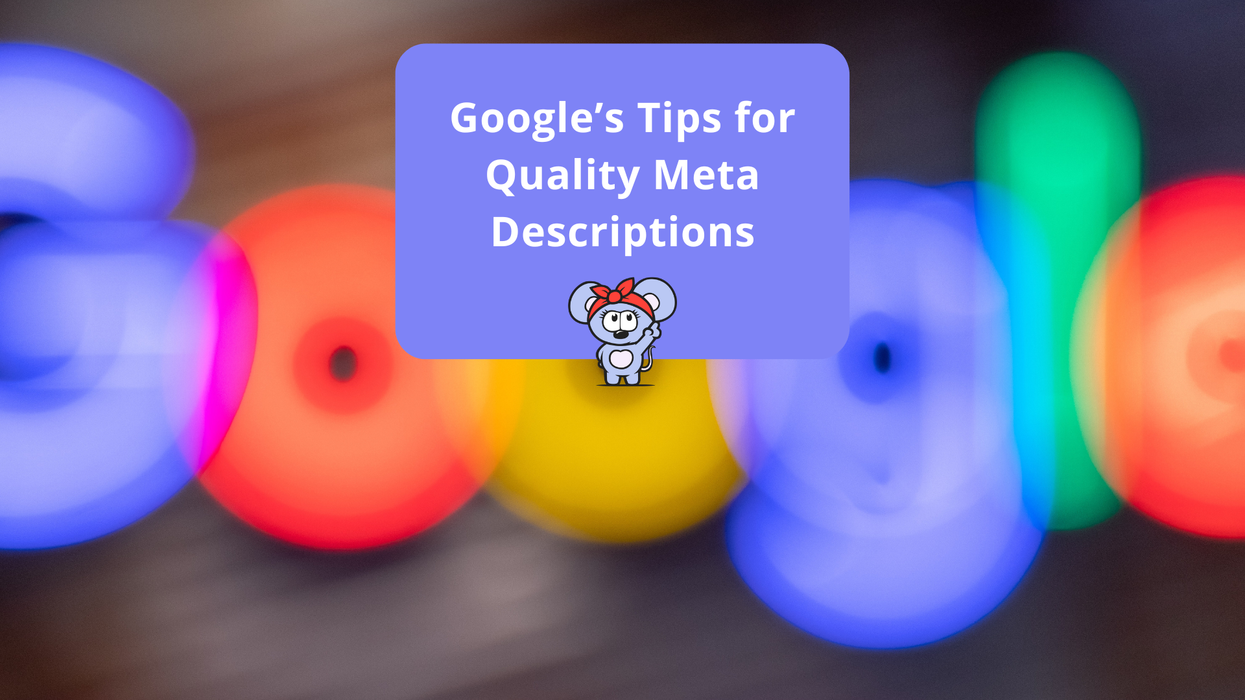There’s a lot that goes into a successful search strategy. While it may seem like an enormous job to make sure your site checks every SEO box, there’s one primary, overarching piece of advice that Google gives to publishers to rank highly on search — write quality content. And that includes meta descriptions. Luckily, Google has provided some insight into the matter.
First Off, What’s a Meta Description?
For SEO purposes, think of metadata as a prime opportunity to describe your website to Google's crawler — the mechanism by which your site and its pages get indexed in Google's database. Google’s crawler will consider the <meta name="description"> tag to get a better understanding of what a certain page is about. Then, Google's search algorithm will rank your site for search queries that it determines are relevant to your content.
Additionally, the meta description tag will be sometimes used to generate a search snippet.
A snippet is the text below a page’s headline in search results:

Google says that high-quality meta descriptions will be chosen for search snippets, and this can have a significant impact on your search traffic.
How Do I Write Good Meta Descriptions?
Google’s primary guidance for writing good meta descriptions is to craft a quality, informative, and relevant description that accurately describes a page’s content. While that’s helpful, it can be hard to determine exactly what makes a meta description high quality, so here are some tips to keep in mind that we summarized from Google’s guidance:
- Unique Meta Descriptions for Every Page: Create a unique meta description for every page on your site if possible. You can use site-level descriptions for the home page and aggregated pages, but try to write a different meta description for every other page on your site. If your time is limited, prioritize your most important content and popular pages.
- Meta Descriptions Don’t Always Have to Be a Sentence: Quality meta descriptions don’t always have to be in the form of a sentence. You can also write them in a way that includes critical facts about the content of your page. For example, here’s a meta description that’s just high-level information about a book instead of a structured sentence:
<meta name="description" content="Written by A.N. Author, Illustrated by V. Gogh, Price: $17.99, Length: 784 pages">
- Programmatically Generate Meta Descriptions: If your site is database driven, like product aggregators, it’s nearly impossible to handwrite meta descriptions for every page. Google encourages meta descriptions to be programmatically generated for these kinds of pages.
- No Official Length Requirement: There’s no official correct length when it comes to meta descriptions. However, Google will shorten the length of snippets based on a user’s device width.
Here are some examples from Google of how bad meta descriptions can be improved:
❌ Bad (List of Keywords)
<meta name="description" content="Sewing supplies, yarn, colored pencils, sewing machines, threads, bobbins, needles">
✔️ Better (Explains What the Shop Sells and Details Like Opening Hours and Location)
<meta name="description" content="Get everything you need to sew your next garment. Open Monday-Friday 8-5pm, located in the Fashion District.">
❌ Bad (Same Description Used for Every News Article)
<meta name="description" content="Local news in Whoville, delivered to your doorstep. Find out what happened today.">
✔️ Better (Uses a Snippet From the Specific News Article)
<meta name="description" content="Upsetting the small town of Whoville, a local elderly man steals everyone's presents the night before an important event. Stay tuned for live updates on the matter.">
❌ Bad (Doesn’t Summarize the Page)
<meta name="description" content="Eggs are a source of joy in everyone's life. When I was a small child, I remember picking eggs from the hen house and bringing them to the kitchen. Those were the days.">
✔️ Better (Summarizes the Whole Page)
<meta name="description" content="Learn how to cook eggs with this complete guide in 1 hour or less. We cover all the methods, including: over-easy, sunny side up, boiled, and poached.">
❌ Bad (Too Short)
<meta name="description" content="Mechanical pencil">
✔️ Better (Specific and Detailed)
<meta name="description" content="Self-sharpening mechanical pencil that autocorrects your penmanship. Includes 2B auto-replenishing lead. Available in both Vintage Pink and Schoolbus Yellow. Order 50+ pencils, get free shipping.">
Why Isn’t Google Using My Meta Descriptions?
Unfortunately, Google will often override your meta description with different text. This usually happens when Google doesn’t believe the provided meta description is an accurate response to the search query. The search engine's crawler takes into consideration not just the metadata, but also the natural language of every page's content. Here is more information from Google:
Google's generation of page titles and descriptions (or "snippets") is completely automated and takes into account both the content of a page as well as references to it that appear on the web. The goal of the snippet and title is to best represent and describe each result and explain how it relates to the user's query. We use a number of different sources for this information, including descriptive information in the title and meta tags for each page. We may also use publicly available information, or create rich results based on markup on the page. While we can't manually change titles or snippets for individual sites, we're always working to make them as relevant as possible.
While it can be frustrating to spend time writing quality meta descriptions only for them to be vetoed by Google, Moz summarizes it best: In most cases, it's universally wiser to write a good meta description rather than let Google scrape the page and display their own.
Make Quality Meta Descriptions a Part of Your Content Workflow
If you’re already focused on creating quality content, it can be hard to remember to enter an HTML tag for your meta description on every single page. RebelMouse is an enterprise-grade CMS that makes writing quality meta descriptions easy and a natural part of your content creation workflow.
You can enter your site’s meta description in our SEO Description field while crafting your content. It’s a part of our game-changing SEO tab that ensures every article is ready for success on search.

It also takes more than just meta descriptions to make it to page one of Google Search. RebelMouse’s prioritization of page performance and holistic approach to search cultivates consistent growth for sites in our network.
Not on RebelMouse yet? Request a proposal today and let’s start working together.

